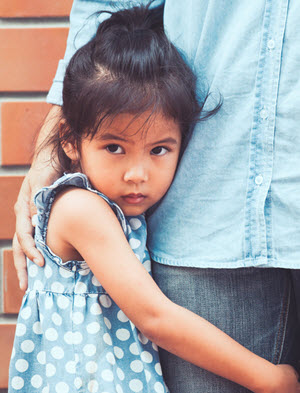 Wearing a variety of masks
Wearing a variety of masks
As a parent, there are certainly times when you can easily recognize that your child is feeling scared and anxious.
They withdraw, cling to you, cry, or say they feel scared.
What you may not realize, though, is that your child also may be showing anxiety through tantrums and meltdowns, hyperactivity and poor focus, behavior challenges, poor social skills, or anger.
 Missing the signs until a crisis emerges
Missing the signs until a crisis emerges
When they bring their child to me for behavior concerns or emotional challenges, parents are often surprised to learn that their child may be struggling with anxiety.
Not all children express anxiety in the same way, and anxiety can look different in the same child at different times in their life.
When a child who is experiencing anxiety is not provided the support needed, their struggles can become a big roadblock to development. The child can become less able to explore the world, try new things, or make and keep friends.
They can be so busy watching what’s going on around them to make sure they’re safe, that they can be misdiagnosed as having attention or hyperactivity problems. Their anxiety can result in a barrage of constant questions about what’s going to happen next – driving their parents and teachers crazy!
Children who are anxious also may avoid activities that most kids find fun and exciting. An anxious child can also have significant behavioral problems that are attempts to hide or manage anxiety.
Anxiety can come from a variety of places
Children thrive on routine, stability, and predictability. When kids experience Big Hard Things, family changes, or other transitions, they often experience anxiety. From that root of anxiety, other emotional or behavioral symptoms tend to appear.
Some children also just naturally have a tendency toward anxiety based on unique personality traits.
A family history of depression, anxiety, or other mental health concerns also may increase the possibility that your child will experience anxiety at some point in life.
Help is available for your struggling child
Even though it can feel hopeless, there is light at the end of this tunnel. You and your child just need some help to get there.
My first goal is to ensure that your child feels safe and secure in my office.
Then, with a variety of tools and strategies, I help you and your child to understand the root of your child’s anxiety and how to manage and decrease emotional and behavioral challenges that are caused by that anxiety.
Healthy, secure relationships are vital to a child’s well-being and ability to cope with stress, so we’ll work to strengthen the attachment and bond between you and your child.
You’ll also receive guidance and practical strategies to immediately put in place. These strategies will work to decrease anxiety and help prepare your child to successfully deal with situations that cause stress.
No matter the severity of your child’s anxiety, we can work together to bring peace and joy to their life. You’ll feel more peaceful and optimistic, too, as you see your child begin to flourish in a new way.
Let’s start resolving the problem of anxiety
Call me today at (951) 599-8383 to discuss how anxiety may be derailing your child’s peace and find the hope that is waiting.

